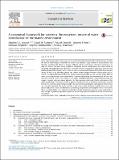A conceptual framework for assessing the ecosystem service of waste remediation: in the marine environment
Abstract
In the marine environment, the ecosystem service of Waste Remediation (WR) enables humans to utilise the natural functioning of ecosystems to process and detoxify a large number of waste products and therefore avoid harmful effects on human wellbeing and the environment. Despite its importance, to date the service has been poorly defined in ecosystem service classifications and rarely valued or quantified. This paper therefore addresses a gap in the literature regarding the application of this key, but poorly documented ecosystem service. Here we present a conceptual framework by which the ecosystem service of WR can be identified, placed into context within current ecosystem classifications and assessed. A working definition of WR in the marine context is provided as is an overview of the different waste types entering the marine environment. Processes influencing the provisioning of WR are categorised according to how they influence the input, cycling/detoxification, sequestration/storage and export of wastes, with operational indicators for these processes discussed. Finally a discussion of the wider significance of the service of WR is given, including how we can maximise the benefits received from it. It is noted that many methods used in the assessment, quantification and valuation of the service are currently hampered due to the benefits of the service often not being tangible assets set in the market and/or due to a lack of information surrounding the processes providing the service. Conclusively this review finds WR to be an under researched but critically important ecosystem service and provides a first attempt at providing operational guidance on the long term sustainable use of WR in marine environments.
Citation
Watson , S C L , Paterson , D M , Queirós , A M , Rees , A P , Stephens , N , Widdicombe , S & Beaumont , N J 2016 , ' A conceptual framework for assessing the ecosystem service of waste remediation: in the marine environment ' , Ecosystem Services , vol. 20 , pp. 69-81 . https://doi.org/10.1016/j.ecoser.2016.06.011
Publication
Ecosystem Services
Status
Peer reviewed
ISSN
2212-0416Type
Journal article
Description
This work [NERC Grant Ref: NE/K501244/1] was funded with support from the Biodiversity and Ecosystem Service Sustainability (BESS) programme. BESS is a six-year programme (2011-2017) funded by the UK Natural Environment Research Council (NERC) and the Biotechnology and Biological Sciences Research Council (BBSRC) as part of the UK׳s Living with Environmental Change (LWEC) programme. The work was also supported by the UK Ocean Acidification (UKOA) research programme (Grant no. NE/H017488/1). DMP also received funding from the MASTS pooling initiative (The Marine Alliance for Science and Technology for Scotland) and their support is gratefully acknowledged. MASTS is funded by the Scottish Funding Council (grant reference HR09011) and contributing institutions.Collections
Items in the St Andrews Research Repository are protected by copyright, with all rights reserved, unless otherwise indicated.

